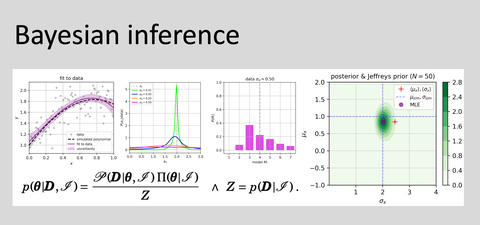Bayesian Inference
Bayesian data analysis has proven to be an essential technique for linking the results of experimental data with mathematical models. The Bayesian approach allows the estimation of model parameters and their uncertainties for a given quantity and quality of experimental data as part of a learning process. This results in the probability distribution of the posterior p(Θ|data) of the model parameters Θ
from the so-called prior of the prior knowledge p(Θ), which is modified by the likelihood LH(data|Θ) on the basis of the experimental data and its quality. The evidence Z, as a completely marginalized quantity with regard to the parameters, only plays the role of a normalization in the context of parameter estimation, but allows the direct calculation of the relevant model probabilities when analyzing different models. The nested sampling method is an efficient method for numerically calculating the usually high-dimensional integrals for calculating the parameter distributions and model probabilities.
In numerous studies, we have found that Bayesian data analysis provides extensive insights for the modeling process: be it in the consideration of the shape of the measurement errors or possible correlations and especially in the extraction of significant model parameters. This usually goes far beyond the possibilities of least square fits and also provides reliable uncertainties for the estimated model parameters.
- Dieterich P, Lindemann O, Moskopp ML, Tauzin S, Huttenlocher A, Klages R, Chechkin A, Schwab A. Asymmetric anomalous diffusion in neutrophil chemotaxis. PLoS Computational Biology 18(5), e1010089/1-26 (2022).
- Warunya W, Moskopp ML, Noll T, Dieterich P. Quantifying and mathematical modeling of the influence of soluble adenylate cyclase on cell cycle in human endothelial cells with Bayesian inference. Journal of Cellular and Molecular Medicine 26(23), 5887-5900 (2022).
- Moskopp ML, Deussen A, Dieterich P. Bayesian inference for the automated adjustment of an image segmentation pipeline - a modular approach applied to wound healing assays. Knowledge-Based Systems 173, 52-61 (2019).
- Hesse J, Leberling S, Boden E, Friebe D, Schmidt T, Ding Z, Dieterich P, Deussen A, Roderigo C, Rose CR, Floss DM, Scheller J, Schrader J. Cytokine formation by epicardium-derived cells is controlled by purinergic signalling and tenascin-C. FASEB J 31(7), 3040-3053 (2017).


